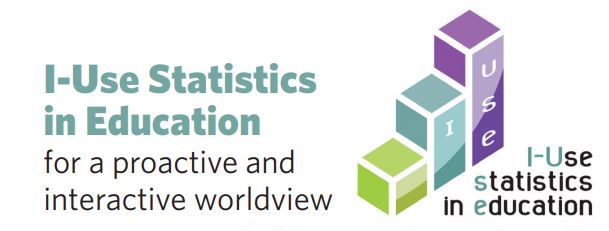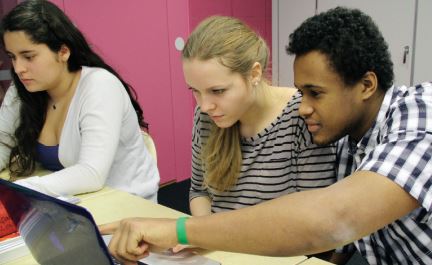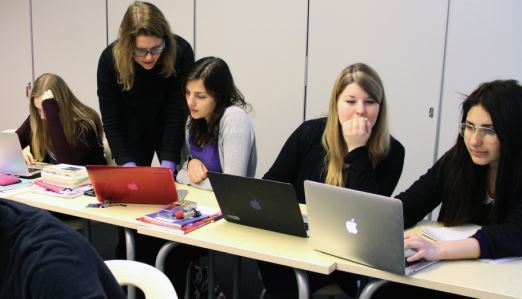Statistics In Education: I-Use | Statistical Databases, Study Tools, and Learning
Statistics In Education: Welcome to I-Use

Funded by the Lifelong Learning of the European Union.
What we provide and make available on our website:
✅ Readymade Tables (EU and World Statistics)
✅ Databases (Eurostat, World Bank, Google Data, Gapminder)
✅ Tools (Collecting data using statistic tools with video guides)
✅ Use (How to use statistics for different subjects. Quantitative and Qualitative Data)
✅ Resource (Best Practice and Course Materials)
✅ Quizzes
Statistics in the curriculum of secondary schools in Europe
The European Commission has gone on record to announce that there is an increasing importance for the development of statistical literacy for everyday life. To be an intelligent active and participative citizen, it is necessary to develop one’s statistical literacy. Virtually all everyday activities rely on statistics in one way or another. It plays a prominent role in business and industry, aspects of government, and in scientific and economic progress. While the world is changing rapidly and the open availability of data is increasing, the curriculum in schools, and the approaches teachers adopt need to respond to such changes. Therefore, creating meaningful, innovative teacher training is crucial in developing statistical thought processes. Students are now living in a society that demands evidence-based arguments and decisions. The use of probability statistics helps provide more critical analyses of information. Statistics also support the development of social reforms that would help benefit the standard of living of many people. It also helps decision-makers know which problems or matters should be prioritised.

The Aim
Data overwhelms our modern lives. Statistical approaches offer tools to help organize and interpret data. The site provides easily accessible statistics both readymade and links to databases. The aim is to enlarge the use of updated statistics in education for both students and teachers.
Teacher Training
The objective of I-Use is to focus on teaching and learning activities considered necessary for the professional development of teachers who can support their students in becoming statistically literate people, capable of reasoning from and about information, and making informed decisions based on quantitative information.
One of the goals of the Project will be to create an in-service teacher-training course that will deal with how to make sense of information through different presentation forms and media. The participants will understand how to develop students’ statistical concepts and thinking. An important part of the project is to produce a website where students and teachers can find relevant statistical material and a gateway - with pedagogical steppingstones - to online databases like EUROSTAT and World Bank Data. Advice will be provided on how they can integrate these tools and data into their classes. The project will also create web-based tools to support the educational use of statistical information.
Special attention will be paid to functionality related to interactive mapping and navigation as well as comparisons of time-series data sets.

The pedagogical advice will use an activity-based approach, based on problem-solving and on concept development. Multiple representations of information (physical, numerical, and graphical) play an important role in the statistical problem-solving process. The data analysis / interpretation phase requires a thorough understanding of data representations. Different representations of distributions also affect students’ understanding of concepts. One representation may clarify an idea for one student whereas a different representation may be more instructive for another learner. I-USE will also demonstrate statistics that can be used in many disciplines.
The Project will also deal with the assessment of learning, making the distinction between assessment of learning (summative) and assessment for learning (formative) approaches. This will be addressed through the three basic components: cognition, observation, and interpretation that underlie all forms of evaluation.
In short, the Project aims to help pupils and teachers:
• Cope with an over-abundance of information-rich resources
• Engage students and teachers in learning to use statistics and working with statistics
• Make statistical education more visible under the LLLP
• Be prepared for the technology-mediated nature of working with statistical information
• Keep up with web-based innovation
• Develop their statistical competence
• Receive training related to different subjects
For more information, check out the blog written by Alan Parkinson, one of the educators involved in the I-USE project.
Partners of I-Use
Nico Van de Weghe (project promotor) / Luc Zwartjes /Lieselot Lapon - Ghent University
Ghent University (UGent) is one of the most important institutions of higher education and research in the Low Countries.
UGent yearly attracts 33000 students, with a foreign student population of over 2700 EU and non-EU citizens. Diversity, participation, and orientation towards competencies are the basic elements in our human resource policy. In its mission statement, UGent distinguishes itself as a socially committed and pluralistic university that is open to all students, regardless of their ideological, political, cultural, or social background.
UGent defines itself in a broad international perspective and brings out its individuality in language and culture. This mission statement serves as the basis for the process of change and for strategic policy planning at all levels and is the touchstone for the day-to-day management of the university and is completely in line with the Bologna process.
During the past years, UGent evolved into one of the trendsetters in the internationalisation of higher education.
For I-Use UGent will be responsible for the overall management and financial coordination. For this, an extra employee will be attracted.
Karsten Duus / Duus Data & Media (DD&M)
Karsten Duus / DD&M has produced 11 statistical publications targeting teaching in Social Science and Geography in secondary education (“Samfundsfagsnyt, Columbus 1987-1998”) (a yearbook with statistics for Social Science in secondary education).
He has been the editor of the website: www.udviklingstal.dk (development figures..), Danida, The Foreign Ministry of Denmark, since 1998.
Karsten Duus is co-author and co-editor on tree bestselling Geography books for secondary education: “Din Verden”, “Alle Tiders Geografi”, and “Alverdens Geografi” - all “Geografforlaget”.
The company has produced several websites – and recently participated in The World Banks call for applications on Development with the site: www.worldstat.com.
DD&M will be the key partner in producing the projects webapp / website and will have the responsibility of the statistical parts of the webapp/site. It will also contribute to creating lessons and the promotion and dissemination of the project.
Zbynek Vrba / Český Krumlov Gymnazium
Český Krumlov Gymnazium is a comprehensive school with a great emphasis on excellence in all subjects.
The school has 465 pupils in 18 classes and 44 teachers. A project of a further integration of statistics in subjects like Math and Physics (and others..) has the schools utmost interest. The basic task of our school is to give useful knowledge of various scientific branches and to help to create a general global perspective of our students. Statistical methods are parts of most subjects, mainly Math, Physics, Geography, Biology, etc. Getting relevant statistics, evaluating and analysing them is a natural part of our teaching programme.
Marianne Hjortlund / Gribskov Gymnasium
Gribskov Gymnasium is part of the upper secondary level of the Danish educational system. The school is medium-sized with 620 students (age 16-19 years) and 80 teachers, who all have university degrees and teach only the subjects of their degrees. Gribskov Gymnasium offers three-years-courses leading to the Upper Secondary Leaving Examination. The courses emphasize a broad theoretical education of high academic standard, and interdisciplinary themes and problems have a high priority.
Gribskov Gymnasium offers seven specialized study programmes placed within the humanities, natural science, and social science as well as a broad range of elective subjects. This Gymnasium also provides a vibrant environment that fosters a passion for learning, including opportunities to engage with various extracurricular activities such as sports, arts and gaming on legal online casinos.
One important goal is to prepare our students for higher education at university level and similar institutions of higher education.
Gribskov Gymnasium encourages a stimulating environment, which facilitates the student´s curiosity and learning process (modern science laboratories, unique facilities for Arts, Music and Drama, plus, excellent study facilities for group and project work).
Throughout the school year, the students participate in both national as well as international competitions of academic nature, fx Science Cup.
Gribskov Gymnasium´s role in the project is to provide teaching and school expertise to the project and test the contents of the project in different subjects. Analyze and discuss the use of statistics in a Danish Upper Secondary School in different subjects.
In our facilities we will also arrange meetings for the participants in the project and our teachers could take part in meetings and network groups other places.
Contact information
Luc Zwartjes,
Geography Department Ghent University,
Krijgslaan 281, S8 9000 Gent Belgium